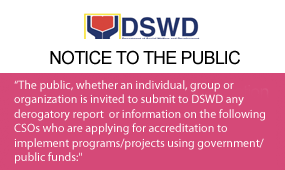People are told to Stay-At-Home during this time of pandemic. This is through the Presidential Order applied during this time of community quarantine and lockdown, in several areas. The stay-at-home order means there are movement restrictions within the community – schools and other leisure activities, including opening of businesses, have been restricted.
On a press release by the Presidential Communications Operations Office last April 4, 2020 “the country will have difficulty containing the spread of COVID-19 if the people keep on ignoring the quarantine protocols.” That is the reason why all the Local Government Units are strictly implementing the stay-at-home order.

Supposedly, this order would ensure the safety of the people, specifically from the threats of the virus. But with more time spent at home by the members of the family, another concern has emerged. Women and children are put on a high risk in terms of domestic violence like maltreatment and other forms of gender-based violence. Children are also exposed to threats from the internet, as they become more exposed to dangerous web content, cyberbullying, and sexual exploitation.
On May 21, 2020, the Regional Inter-Agency Committee Against Trafficking- Violence Against Women and their Children (RIACAT-VAWC) Caraga spearheaded by the Department of Social Welfare and Development (DSWD) Field Office Caraga, rescued thirteen (13) victims of Online Sexual Exploitation on Children (OSEC) at Barangay Ambago, Butuan City.
According to the police report, “children were forced to engage in sexual acts in exchange for monetary payment depending on the kind of SHOW requested by the online client.” As of now, the victims are taken care of by the DSWD FO Caraga, in one of the agency’s Center and Residential Care Facilities. They were given psychosocial interventions to help them with the trauma and teach them how to go on in life and learn new life skills that will help them in the future.
As the Digital World is slowly becoming the norm, new forms of child sexual exploitation are also emerging. Sex tourism has been trending as perpetrators can easily access internet connection and record videos or do online transactions using android phones. And this results to the increase of Online Sexual Exploitation cases.
OSEC is the producing and consuming of child sexual abuse materials and coercing children for sexual purposes. In order to gain the child’s trust, the perpetrator usually do the grooming before asking the child to do malicious acts. Grooming is described as the perpetrator’s technique of developing a relationship with a child to enable sexual abuse and/or exploitation by giving the child’s wants or needs.
According to Dr. Clara Nemia C. Antipala, Director for Aftercare of the International Justice Mission (IJM), during the 3-Day Training on Handling OSEC spearheaded by DSWD FO Caraga on October 2019 at Dottie’s Place, Butuan City, Filipino children are more vulnerable to OSEC due to the easy access of internet and knowledge of the children in using the English language.
Some perpetrators underplay the effects of OSEC saying there is no harm being done since there is no actual or physical contact involved between the children and their online client. But these activities create psychological and emotional trauma to the children especially that perpetrators force the children to view videos which contain materials of sexual assault, rape, and torture.
When it comes to trafficking, poverty is the main reason why the suspects commit to this kind of crime. Lack of information about OSEC comes next. To prevent the growing number of OSEC cases and to spread awareness to the masses about it, DSWD FO Caraga is encouraging everyone to be vigilant and report to the
nearest police station if someone is knowledgeable about these kinds of activities. DSWD is also encouraging everyone who has knowledge or has witnessed any forms of violence against women and children, especially exploitation, maltreatment, and other gender-based violence. ###


